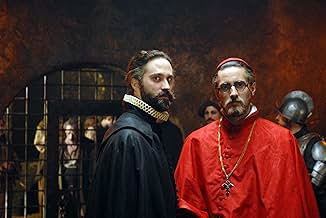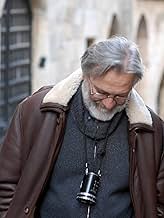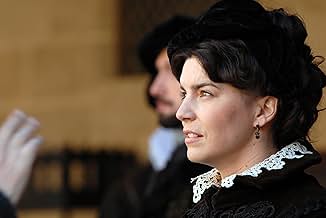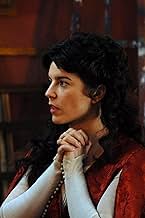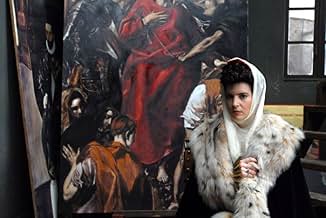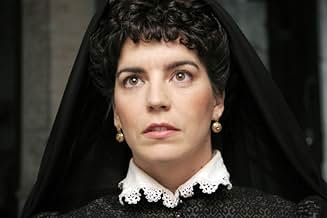El Greco
- 2007
- 1h 59min
Agrega una trama en tu idiomaThe story of the uncompromising artist and fighter for freedom, Domenicos Theotokopoulos, known to the world as "El Greco".The story of the uncompromising artist and fighter for freedom, Domenicos Theotokopoulos, known to the world as "El Greco".The story of the uncompromising artist and fighter for freedom, Domenicos Theotokopoulos, known to the world as "El Greco".
- Dirección
- Guionistas
- Elenco
- Premios
- 12 premios ganados y 2 nominaciones en total
- El Greco
- (as Nick Ashdon)
- Duke Da Rimi
- (as Yorgos Christodoulou)
- Don Miguel de las Cuevas
- (as Fermi Reixac)
- Manousos
- (as Theo Zoumpoulidis)
- Titian's Assistant
- (as Yorgos Karamichos)
- Auctioneer
- (as Renos Charalampidis)
- Greco's Father
- (as Yorgos Charalampidis)
- Older Inquisitor
- (as Ricard Borras)
- Dirección
- Guionistas
- Todo el elenco y el equipo
- Producción, taquilla y más en IMDbPro
Opiniones destacadas
Widely promoted as "the most important Greek production ever" (of which there seems to be a new one every year), El Greco seems bound to achieve considerable commercial success in the Greek market. But it is the kind of movie most people will claim to like, and no one will bother to see twice. Which, after all, is the true indicator of a film's appeal. We weren't expecting loud explosions and car chases on a production about El Greco ; but a reasonable, intelligent plot and dialog that would not make you squirm in your seat in embarrassment would have been nice.
Not recommended. For those that missed it, worry not. You'll have another "greatest Greek production ever" foisted on you by the Greek television channel-sponsors to look forward to next year.
The tag line of this movie is "Can darkness overcome light?"
But, the photography is standard fare -as if it were made for television. The cinematographer fails miserably to grasp the opportunity afforded by telling the life of a painter in authoring with light and shadow and colors. It seems they did nothing but use textbook light and print what was in the camera without any of the care that makes Spielberg's cinematographers worth applauding.
The direction is honest but it falls into the trap of directing actors in what to do and how to do it, instead of allowing them to breathe their own life into the film, for themselves. The actors, most of the time are the slaves of the cinematographer as puppets in ever-changing dramatic photographs.
Nick Ashdon portrayed the main character as well as he was allowed by a limp and insecure director -unfortunately watching Nick Ashdon as El Greco was an exercise in trying to remember that I was not watching Joseph Fiennes in Shakespeare in Love.
Juan Diego Botto as Niño de Guevara must have, in rehearsals, given director Smaragdis an expression from a certain camera angle that the director liked a lot, so he must have asked Botto to keep repeating it throughout the movie.
There are some really bizarre moments of editing that make you wonder whether the director was interfering in the editor's work without the skill to do so, or whether the editor sneaked-in a few cuts that the director missed before the release. Then again they might have both been trying to make a dramatic statement but the efforts bore no fruit.
This film is a genuinely honest effort by a genuine Greek director and crew to make a labor of love in telling the story and the soul of a great man. I urge you to watch it with this in mind. Because otherwise you will watch a film where the director, despite his passion, just didn't have what it takes.
This is a costumer partially based on facts but predominates the slow-moving melodrama . Historic film about an uncompromising artist , El Greco/Nick Clark and his relationship to lovers and powerful people from Renaissance . The picture relies heavily on the loving relationships between El Greco and his women as Francesa/Dimitra Matsouka and Jerónima De Las Cuevas/Laia Marull as well as the patronage and subsequent confrontation to Niño De Guevara , the General Inquisitor/Juan Diego Botto , that was painted on a famous painting. This is a moving biography of the prestigious painter and fighter for freedom , including some fictitious elements . Glamorously as well as sumptuously photographed by Stavrou , and being lavishly produced by Greece and Spain . The motion picture was professionally directed Yannis Smaragdis and filmed with a pervasive melancholy that does for slow drama .
The picture based on actual events , these are the followings : In 1577, El Greco migrated to Madrid, then to Toledo, where he produced his mature Works . At the time, Toledo was the religious capital of Spain and a populous city . In Rome, El Greco had earned the respect of some intellectuals, but was also facing the hostility of certain art critics . During the 1570s the huge monastery-palace of El Escorial was still under construction and Philip II of Spain was experiencing difficulties in finding good artists for the many large paintings required to decorate it. El Greco met Benito Arias Montano, a Spanish humanist and agent of Philip; Pedro Chacón, a clergyman; and Luis de Castilla, son of Diego de Castilla, the dean of the Cathedral of Toledo. El Greco's friendship with Castilla would secure his first large commissions in Toledo. He arrived in Toledo by July 1577, and signed contracts for a group of paintings that was to adorn the church of Santo Domingo el Antiguo in Toledo and for the renowned El Espolio. By September 1579 he had completed nine paintings for Santo Domingo, including The Trinity and The Assumption of the Virgin. These works would establish the painter's reputation in Toledo. El Greco did not plan to settle permanently in Toledo, since his final aim was to win the favor of Philip and make his mark in his court. Indeed, he did manage to secure two important commissions from the monarch: Allegory of the Holy League and Martyrdom of St. Maurice. However, the king did not like these works and placed the St Maurice altarpiece in the chapter-house rather than the intended chapel. He gave no further commissions to El Greco. The exact reasons for the king's dissatisfaction remain unclear. Some scholars have suggested that Philip did not like the inclusion of living persons in a religious scene; some others that El Greco's works violated a basic rule of the Counter-Reformation, namely that in the image the content was paramount rather than the style. Philip took a close interest in his artistic commissions, and had very decided tastes; a long sought-after sculpted Crucifixion by Benvenuto Cellini also failed to please when it arrived, and was likewise exiled to a less prominent place. In any case, Philip's dissatisfaction ended any hopes of royal patronage El Greco may have had . Lacking the favor of the king, El Greco was obliged to remain in Toledo, where he had been received in 1577 as a great painter. While "Crete gave him life and the painter's craft, Toledo a better homeland, where through Death he began to achieve eternal life" . On 12 March 1586 he obtained the commission for The Burial of the Count of Orgaz, now his best-known work. During these years he received several major commissions, and his workshop created pictorial and sculptural ensembles for a variety of religious institutions, as the commission of The Virgin of the Immaculate Conception and for the Hospital of Saint John the Baptist , creating notorious paintings as The Disrobing of Christ , The Assumption of the Virgin , THe Holy Trinity , The Virgin of the Immaculate Conception .. In his mature works El Greco demonstrated a characteristic tendency to dramatize rather than to describe and the strong spiritual emotion transfers from painting directly to the audience . El Greco's preference for exceptionally tall and slender figures and elongated compositions, which served both his expressive purposes and aesthetic principles, led him to disregard the laws of nature and elongate his compositions to ever greater extents, particularly when they were destined for altarpieces .
¿Sabías que…?
- TriviaThe last acting performance by Sotiris Moustakas.
- ErroresJust after the battle, the wound on El Greco father's forehead changes places between shots, from left forehead to just over his eyebrow.
- Citas
El Greco: You once reached out for God, and your fingers closed on emptiness ; and you didn't learn. How can God speak to you when instead of loving you burn, ruin and spread hatred all around?
El Greco: Now, of course, my turn has come - but you can't burn me... and I'll tell you why :
El Greco: Because I've been burning all my life, my entire life ; not in the fire, in the light. I threw myself into the blaze of it.
El Greco: You light fires because you're afraid to burn. You are afraid of the light and this is why I pity you, my old friend, Niño de Guevara.
El Greco: Because you aren't wrong to be afraid, but every flame you light drives you deeper into the darkness and no matter how many people you burn, you will never escape it.
El Greco: Can the darkness condemn the light?
- Bandas sonorasTa dakrya einai dyo logio
Performed by Loudovikos ton Anogeion
Selecciones populares
- How long is El Greco?Con tecnología de Alexa
Detalles
- Fecha de lanzamiento
- Países de origen
- Idiomas
- También se conoce como
- El Greco - El último desafío a Dios
- Locaciones de filmación
- Rhodes, Grecia(Castle of the Grand Master)
- Productoras
- Ver más créditos de la compañía en IMDbPro
Taquilla
- Total a nivel mundial
- USD 9,620,040
- Tiempo de ejecución1 hora 59 minutos
- Color
- Mezcla de sonido
- Relación de aspecto
- 1.78 : 1
Contribuir a esta página


